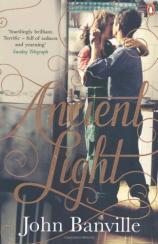Ancient Light
Review
Ancient Light
ANCIENT LIGHT, the 18th novel from Man Booker Prize-winning Irish novelist John Banville (THE SEA), is the tragicomic story of a 15-year-old boy’s affair with a woman more than twice his age, told in the wistful, knowing voice of the man that boy has become half a century later.
From its startling first sentence, “Billy Gray was my best friend and I fell in love with his mother,” it’s clear we are in the hands of a master storyteller. The novel’s narrator, Alexander Cleave, is an aging stage actor who's been forced into a premature retirement. He’s inexplicably offered his first film role, portraying a shadowy character named Axel Vander, the subject of two earlier Banville novels, ECLIPSE and THE SHROUD, where Cleave told the story of Vander’s relationship with Cleave’s daughter Cass, whose suicide in Italy 10 years earlier hovers over this story.
"Anyone with a glimmer of memory of a first love, even one far more conventional than Alex’s, will find echoes of that experience in this rueful, tender novel."
Cleave interweaves vivid recollections of his affair with 35-year-old Celia Gray in their small Irish town, frankly admitting that “half the time I cannot tell whether they are memories or inventions,” with an account of his work on the film (aptly titled The Invention of the Past), and his meeting there with his co-star, a troubled actress who evokes memories of his dead daughter. Alex’s stories of his encounters with Mrs. Gray are intensely erotic, describing as they do a sexual initiation that can only be described as extraordinary.
Banville patiently contrasts young Alex’s seemingly insatiable lust (“a giddily intensified mixture of anticipation and alarm”) and the equally passionate, if carefully measured, response of his lover. It seems clear from the start that, for Celia, the affair is about much more than slaking her desire or satisfying some perverse sexual curiosity. The abiding tone of the novel is elegiac, enhanced by Banville’s often acknowledged gift for descriptive prose, evident on nearly every page and yet somehow unobtrusive.
Whether it’s his picture of “the ground around us plated with the hammered gold of fallen leaves,” or a day when “the estuary was a shifting mass of turbulent purple, and the horizon fringed with a boiling of ice-white clouds,” his images are consistently fresh and apt. That talent isn’t limited to these brief word pictures, as in this instance, where Alex summons up a memory of one of his trysts in an abandoned house in a hazel wood they have made their own:
“I recall a drowsy noontide and the two of us lying quietly together in a tangle of sweat-smeared limbs, a wasp buzzing at the corner of a broken pane and a smoking blade of sunlight from one of the holes in the roof plunged at an angle in the floor beside us.”
Cleave’s frank reflections on the “illuminable dimness of my self-regarding consciousness” are a graceful counterpoint to the novel’s dominant seriousness. There are more than occasional flashes of humor, as when young Alex charitably concedes of his friend Billy that he “would not have minded if he had been sleeping with my mother, difficult though that would have been to imagine.” Or when he converts the weariness of Mrs. Gray’s optician husband on his return from a long day at work into a hoped-for terminal illness he dreams will hasten the elder man’s demise and pave the wave for his own eventual marriage to Celia (“If the old boy were to croak, there at last and gloriously would be my chance.”) When Alex rushes from his first encounter with Mrs. Gray to confess to a priest (named Father Priest) who “was as loath to hear my sins as I was to confess them,” the scene is a comic treat.
Considering the mad improbability of Alex and Celia’s relationship, it’s giving nothing away to pronounce it doomed from the start, unmasked in the same odd corner of the Gray house where it began. But near the end of the novel, Banville offers a revelation, as sad as it is startling, that provides at least some explanation for Mrs. Gray’s willingness to risk disgrace and the ruin of her family on this disastrous affair, upending the narrative Alex has carried for the 50 years that separate him from these events while deepening our compassion for these characters. Anyone with a glimmer of memory of a first love, even one far more conventional than Alex’s, will find echoes of that experience in this rueful, tender novel.
Reviewed by Harvey Freedenberg on October 23, 2012
Ancient Light
- Publication Date: July 2, 2013
- Paperback: 304 pages
- Publisher: Vintage
- ISBN-10: 0307946924
- ISBN-13: 9780307946928




